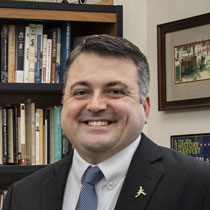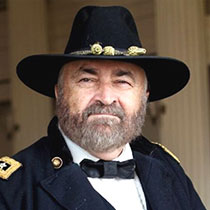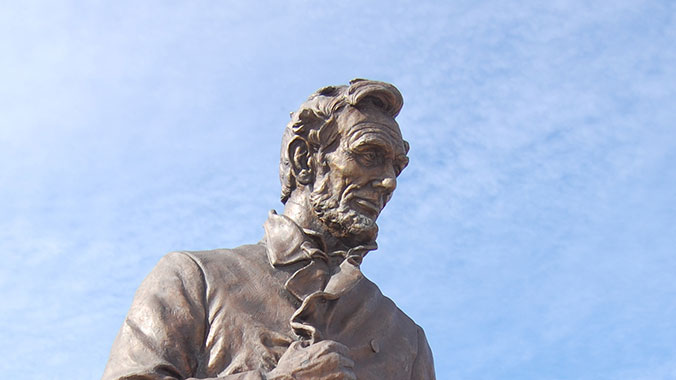Honor's Voice: The Transformation of Abraham Lincoln
by Douglas Wilson
383 pages
Abraham Lincoln's remarkable emergence from the rural Midwest and his rise to the presidency have been the stuff of romance and legend. Douglas L. Wilson shows us that Lincoln's transformation was not one long triumphal march, but a process that was more than once seriously derailed. There were times, in his journey from storekeeper and mill operator to lawyer and member of the Illinois state legislature, when Lincoln lost his nerve and self-confidence - on at least two occasions he became so despondent as to appear suicidal - and when his acute emotional vulnerabilities were exposed.
Focusing on the crucial years between 1831 and 1842, Wilson's skillful analysis of the testimonies and writings of Lincoln's contemporaries reveals the individual behind the legends. We see Lincoln as a boy: not the dutiful son studying by firelight, but the stubborn rebel determined to make something of himself. We see him as a young man: not the ascendant statesman, but the canny local politician who was renowned for his talents in wrestling and storytelling (as well as for his extensive store of off-color jokes). Wilson also reconstructs Lincoln's frequently anguished personal life: his religious skepticism, recurrent bouts of depression, and difficult relationships with women - from Ann Rutledge to Mary Owens to Mary Todd.
Meticulously researched and well written, this is a fascinating book that makes us reexamine our ideas about one of the icons of American history.
The Fiery Trial: Abraham Lincoln and American Slavery
by Eric Foner
448 pages
Winner of the 2011 Pulitzer Prize in History, the Bancroft Prize, and the Lincoln Prize: from a master historian, the story of Lincoln's -- and the nation's -- transformation through the crucible of slavery and emancipation.
In this landmark work of deep scholarship and insight, Eric Foner gives us the definitive history of Lincoln and the end of slavery in America. Foner begins with Lincoln's youth in Indiana and Illinois and follows the trajectory of his career across an increasingly tense and shifting political terrain from Illinois to Washington, D.C. Although "naturally anti-slavery" for as long as he can remember, Lincoln scrupulously holds to the position that the Constitution protects the institution in the original slave states. But the political landscape is transformed in 1854 when the Kansas-Nebraska Act makes the expansion of slavery a national issue.
A man of considered words and deliberate actions, Lincoln navigates the dynamic politics deftly, taking measured steps, often along a path forged by abolitionists and radicals in his party. Lincoln rises to leadership in the new Republican Party by calibrating his politics to the broadest possible antislavery coalition. As president of a divided nation and commander in chief at war, displaying a similar compound of pragmatism and principle, Lincoln finally embraces what he calls the Civil War's "fundamental and astounding" result: the immediate, uncompensated abolition of slavery and recognition of blacks as American citizens.
Foner's Lincoln emerges as a leader, one whose greatness lies in his capacity for moral and political growth through real engagement with allies and critics alike. Contains 16 pages black-and-white illustrations and 3 maps.
Honor’s Voice: The Transformation of Abraham Lincoln
by Douglas Wilson
383 pages
Abraham Lincoln's remarkable emergence from the rural Midwest and his rise to the presidency have been the stuff of romance and legend. Douglas L. Wilson shows that Lincoln's transformation was not one long triumphal march, but a process that was more than once seriously derailed. There were times, in his journey from storekeeper and mill operator to lawyer and member of the Illinois state legislature, when Lincoln lost his nerve and self-confidence - on at least two occasions he became so despondent as to appear suicidal - and when his acute emotional vulnerabilities were exposed.
Focusing on the crucial years between 1831 and 1842, Wilson's skillful analysis of the testimonies and writings of Lincoln's contemporaries reveals the individual behind the legends. We see Lincoln as a boy: not the dutiful son studying by firelight, but the stubborn rebel determined to make something of himself. We see him as a young man: not the ascendant statesman, but the canny local politician who was renowned for his talents in wrestling and storytelling (as well as for his extensive store of off-color jokes). Wilson also reconstructs Lincoln's frequently anguished personal life: his religious skepticism, recurrent bouts of depression, and difficult relationships with women - from Ann Rutledge to Mary Owens to Mary Todd.
Stealing Lincoln's Body
by Thomas J Craughwell
On the night of the presidential election in 1876, a gang of counterfeiters out of Chicago attempted to steal the entombed embalmed body of Abraham Lincoln and hold it for ransom. The custodian of the tomb was so shaken by the incident that he willingly dedicated the rest of his life to protecting the president's corpse.
In a lively and dramatic narrative, Thomas J. Craughwell returns to this bizarre, and largely forgotten, event with the first book to place the grave robbery in historical context. He takes us through the planning and execution of the crime and the outcome of the investigation. He describes the reactions of Mary Todd Lincoln and Robert Todd Lincoln to the theft—and the peculiar silence of a nation. He follows the unlikely tale of what happened to Lincoln's remains after the attempted robbery, and details the plan devised by the Lincoln Guard of Honor to prevent a similar abominable recurrence.
Along the way, Craughwell offers entertaining sidelights on the rise of counterfeiting in America and the establishment of the Secret Service to combat it; the prevalence of grave robberies; the art of nineteenth-century embalming; and the emergence among Irish immigrants of an ambitious middle class—and a criminal underclass.
This rousing story of hapless con men, intrepid federal agents, and ordinary Springfield citizens who honored their native son by keeping a valuable, burdensome secret for decades offers a riveting glimpse into late-nineteenth-century America, and underscores that truth really is sometimes stranger than fiction. Paperback: 288 pages
Lincoln
by David Herbert Donald
714 pages
Winner of the Lincoln Prize, 1996
Regarded as a classic in American history and biography, David Herbert Donald's "Lincoln" is a masterly account of how one man's extraordinary political acumen steered the Union to victory in the Civil War, and of how his soaring rhetoric gave meaning to that agonizing struggle for nationhood and equality. This fully rounded biography of America's sixteenth President is the product of Donald's half-century of study of Lincoln and his times. In preparing it, Donald has drawn more extensively than any previous writer on Lincoln's personal papers and those of his contemporaries, and he has taken full advantage of the voluminous newly discovered records of Lincoln's legal practice. He presents his findings with the same literary skill and psychological understanding exhibited in his previous biographies, which have received two Pulitzer Prizes. Donald brilliantly traces Lincoln's rise from humble origins in Kentucky to prominent positions in legal and political circles in Illinois, and then to the pinnacle of the presidency. He shows how, in all these roles, Lincoln repeatedly demonstrated his enormous capacity for growth, which enabled one of the least experienced and most poorly prepared men ever elected to high office to become a giant in the annals of American politics. Much more than a political biography, Donald's Lincoln reveals the development of the future President's character and shows how his private life helped to shape his public career. Donald's biography is written from Lincoln's point of view. Donald seats us behind the President's desk, where we read the papers and reports he received and wrote, meet the politicians and generals and ordinary citizens who visited his office, and observe him evaluating the evidence before him and making the decisions that shaped modern America.
Abraham Lincoln: A Life: 2 volume set
by Michael Burlingame
Pages 2008
In the first multi-volume biography of Abraham Lincoln to be published in decades, Lincoln scholar Michael Burlingame offers a fresh look at the life of one of America's greatest presidents. Incorporating the field notes of earlier biographers, along with decades of research in multiple manuscript archives and long-neglected newspapers, this remarkable work both alters and reinforces current understanding of America's sixteenth president.
Volume 1 covers Lincoln's early childhood, his experiences as a farm boy in Indiana and Illinois, his legal training, and the political ambition that led to a term in Congress in the 1840s. In volume 2, Burlingame examines Lincoln's life during his presidency and the Civil War, narrating in fascinating detail the crisis over Fort Sumter and Lincoln's own battles with relentless office seekers, hostile newspaper editors and incompetent field commanders. Burlingame also offers new interpretations of Lincoln's private life, discussing his marriage to Mary Todd and the untimely deaths of two sons to disease.
But through it all, his difficult childhood, his contentious political career, a fratricidal war, and tragic personal losses, Lincoln preserved a keen sense of humor and acquired a psychological maturity that proved to be the North's most valuable asset in winning the Civil War.
Published to coincide with the 200th anniversary of Lincoln's birth, this landmark publication establishes Burlingame as the most assiduous Lincoln biographer of recent memory and brings Lincoln alive to modern readers as never before.
Lincoln’s New Salem
by Benjamin P. Thomas
166 pages
Thomas tells the story of the village where Abraham Lincoln lived from 1831 to 1837. His three-part examination of the village often referred to as Lincolns "Alma Mater" features the founding and early history of New Salem, Lincolns impact on the village and its effect on him, and the story of the Lincoln legend and the reconstruction of the town.
Thomas argues convincingly that New Salem was the town where Lincoln acquired faith in himself, faith in people. At 22 the future president drifted into town seeking to become a blacksmith. Thomas introduces us to the people who created New Salem and who knew, influenced, and befriended Lincoln. Thomas highlights Lincolns arrival, his relationships with his neighbors, his important wrestling match with Jack Armstrong, his self-education, his quiet career as an Indian fighter, his experience as a postmaster largely indifferent to postal regulations, his financial woes as a businessman, his loyal friends who often came to his aid, and his election to the legislature.
This colorful history closes with a discussion of the Lincoln legend. The truth of the stories is unimportant. What matters is that the growing Lincoln legend prompted the gradual realization that New Salem was not a dismal mire from which President Lincoln had had to extricate himself but was, in fact, an energizing force. This realization led to research and finally to the restoration of New Salem, which began in 1932.
Mary Todd Lincoln: A Biography
by Jean H. Baker
452 pages
This definitive biography of Mary Todd Lincoln beautifully conveys her tumultuous life and times. A privileged daughter of the proud clan that founded Lexington, Kentucky, Mary fell into a stormy romance with the raw Illinois attorney Abraham Lincoln. For twenty-five years the Lincolns forged opposing temperaments into a tolerant, loving marriage. Even as the nation suffered secession and civil war, Mary experienced the tragedies of losing a son and then her husband. An insanity trial later orchestrated by her surviving son led to her confinement in an asylum. Mary Todd Lincoln is still often portrayed in one dimension, as the stereotype of the best-hated faults of all women. Here her life is restored for us whole.
Lincoln's New Salem
by Benjamin P. Thomas
166 pages
Thomas tells the story of the village where Abraham Lincoln lived from 1831 to 1837. His three-part examination of the village often referred to as Lincoln's "Alma Mater" features the founding and early history of New Salem, Lincoln's impact on the village and its effect on him, and the story of the Lincoln legend and the reconstruction of the town.
Thomas argues convincingly that New Salem was the town where Lincoln acquired faith in himself, faith in people. At 22 the future president drifted into town seeking to become a blacksmith. Thomas introduces us to the people who created New Salem and who knew, influenced, and befriended Lincoln. Thomas highlights Lincoln's arrival, his relationships with his neighbors, his important wrestling match with Jack Armstrong, his self-education, his quiet career as an Indian fighter, his experience as a postmaster largely indifferent to postal regulations, his financial woes as a businessman, his loyal friends who often came to his aid, and his election to the legislature.
This colorful history closes with a discussion of the Lincoln legend. The truth of the stories is unimportant. What matters is that the growing Lincoln legend prompted the gradual realization that New Salem was not a dismal mire from which President Lincoln had had to extricate himself but was, in fact, an energizing force. This realization led to research and finally to the restoration of New Salem, which began in 1932.
Giant in the Shadows: The Life of Robert T. Lincoln
by Jason Emerson
Although he was Abraham and Mary Lincoln's oldest and last surviving son, the details of Robert T. Lincoln's life are misunderstood by some and unknown to many others. Born in a boarding house but passing his last days at ease on a lavish country estate, Robert Lincoln played many roles during his lifetime. As a president's son, a Union soldier, a minister to Great Britain, and a U.S. secretary of war, Lincoln was indisputably a titan of his age. Much like his father, he became one of the nations most respected and influential men, building a successful law practice in the city of Chicago, serving shrewdly as president of the Pullman Car Company, and at one time even being considered as a candidate for the U.S. presidency.
Along the way he bore witness to some of the most dramatic moments in America's history, including Robert E. Lee's surrender at Appomattox Courthouse; the advent of the railroad, telephone, electrical, and automobile industries; the circumstances surrounding the assassinations of three presidents of the United States; and the momentous presidential election of 1912. Giant in the Shadows also reveals Robert T. Lincoln's complex relationships with his famous parents and includes previously unpublished insights into their personalities. Emerson reveals new details about Robert's role as his father's confidant during the brutal years of the Civil War and his reaction to his father's murder; his prosecution of the thieves who attempted to steal his father's body in 1876 and the extraordinary measures he took to ensure it would never happen again; as well as details about the painful decision to have his mother committed to a mental facility. In addition Emerson explores the relationship between Robert and his children, and exposes the actual story of his stewardship of the Lincoln legacy--including what he and his wife really destroyed and what was preserved. Emerson also delves into the true reason Robert is not buried in Springfield, Illinois.
Chasing Lincoln's Killer
by James L. Swanson
Based on rare archival material, obscure trial manuscripts, and interviews with relatives of the conspirators and the manhunters, CHASING LINCOLN'S KILLER is a fast-paced thriller about the pursuit and capture of John Wilkes Booth: a wild twelve-day chase through the streets of Washington, D.C., across the swamps of Maryland, and into the forests of Virginia.
•Hardcover: 208 pages
•Age Range: 12 and up
•Grade Level: 7 and up
Mrs. Lincoln: A Life
by Catherine Clinton
Pages 432
Mary Lincoln's story is inextricably tied with the story of America and with her husband's presidency, yet her life is an extraordinary chronicle on its own. Born into an aristocratic Kentucky family, she was an educated, well-connected Southern daughter. When she married a Springfield lawyer she became a Northern wife, an experience mirrored by thousands of her countrywomen. The Lincolns endured many personal setbacks, including the death of a child and defeats in two U.S. Senate races, along the road to the White House. Mrs. Lincoln herself suffered scorching press attacks, but remained faithful to the Union and her wartime husband.
She was also the first presidential wife known as the "First Lady," and it was in this role that she gained her lasting fame. The assassination of her husband haunted her for the rest of her life. Her disintegrating downward spiral resulted in a brief but traumatizing involuntary incarceration in an asylum and self-exile in Europe during her later years. One of the most tragic and mysterious of nineteenth-century figures, Mary Lincoln and her story symbolize the pain and loss of Civil War America.
Lincoln President-Elect: Abraham Lincoln and the Great Secession Winter 1860-1861
by Harold Holzer
640 pages
One of our most eminent Lincoln scholars and winner of a Lincoln Prize for his "Lincoln at Cooper Union," Harold Holzer examines the four months between Lincoln's election and inauguration, when the president-elect made the most important decision of his coming presidency -- there would be no compromise on slavery or secession of the slaveholding states, even at the cost of civil war.
Abraham Lincoln first demonstrated his determination and leadership in the Great Secession Winter -- the four months between his election in November 1860 and his inauguration in March 1861 -- when he rejected compromises urged on him by Republicans and Democrats, Northerners and Southerners, that might have preserved the Union a little longer but would have enshrined slavery for generations. Though Lincoln has been criticized by many historians for failing to appreciate the severity of the secession crisis that greeted his victory, Harold Holzer shows that the president-elect waged a shrewd and complex campaign to prevent the expansion of slavery while vainly trying to limit secession to a few Deep South states.
During this most dangerous White House transition in American history, the country had two presidents: one powerless (the president-elect, possessing no constitutional authority), the other paralyzed (the incumbent who refused to act). Through limited, brilliantly timed and crafted public statements, determined private letters, tough political pressure and personal persuasion, Lincoln guaranteed the integrity of the American political process of majority rule, sounded the death knell of slavery, and transformed not only his own image but that of the presidency, even while making inevitable the war that would be necessary to make these achievements permanent.
This is the first book to concentrate on Lincoln's public stance and private agony during these months and on the momentous consequences when he first demonstrated his determination and leadership.
Lincoln's Body: A Cultural History Hardcover
by Richard Wightman Fox
Even two hundred years after Abraham Lincoln's death, we, like Walt Whitman, "love the President personally." In a stunning feat of scholarship, insight, and engaging prose, Lincoln's Body explores how a president ungainly in body and downright "ugly" of aspect came to mean so much to us.
The very roughness of Lincoln's appearance made him seem all the more common, one of us—as did his sense of humor about his own awkward physical nature. Nineteenth-century African Americans felt deep affection for their "liberator" as a "homely" man who did not hold himself apart. During Reconstruction, Southerners felt nostalgia for the humility of Lincoln, whom they envisioned as a "conciliator." Later, teachers glorified Lincoln as a symbol of nationhood that would appeal to poor immigrants. Monument makers focused not only on the man’s gigantic body but also on his nationalist efforts to save the Union, downplaying his emancipation of the slaves.
Among both black and white liberals in the 1960s and 1970s, Lincoln was derided or fell out of fashion. More recently, Lincoln has once again been embodied (as both idealist and pragmatist, unafraid of conflict and transcending it) by outstanding historians, by self-identified Lincolnian president Barack Obama, and by actor Daniel Day-Lewis—all keeping Lincoln alive in a body of memory that speaks volumes about our nation.
Lincoln's Battle with God: A President's Struggle with Faith and What It Meant for America
by Stephen Mansfield
Abraham Lincoln is the most beloved of all U.S. presidents. He freed the slaves, gave the world some of its most beautiful phrases, and redefined the meaning of America. He did all of this with wisdom, compassion, and wit.
Yet, throughout his life, Lincoln fought with God. In his early years in Illinois, he rejected even the existence of God and became the village atheist. In time, this changed but still he wrestled with the truth of the Bible, preachers, doctrines, the will of God, the providence of God, and then, finally, God’s purposes in the Civil War. Still, on the day he was shot, Lincoln said he longed to go to Jerusalem to walk in the Savior’s steps.
What had happened? What was the journey that took Abraham Lincoln from outspoken atheist to a man who yearned to walk in the footsteps of Christ?
In this thrilling journey through a largely unknown part of American history, New York Times best-selling author Stephen Mansfield tells the richly textured story of Abraham Lincoln’s spiritual life and draws from it a meaning sure to inspire Americans today. 272 pages
The Madness of Mary Lincoln
by Jason Emerson
255 pages
In 2005, historian Jason Emerson discovered a steamer trunk formerly owned by Robert Todd Lincoln's lawyer and stowed in an attic for forty years. The trunk contained a rare find: twenty-five letters pertaining to Mary Todd Lincoln's life and insanity case, letters assumed long destroyed by the Lincoln family. Mary wrote twenty of the letters herself, more than half from the insane asylum to which her son Robert had her committed, and many in the months and years after.
Emerson charts Mary Lincoln's mental illness throughout her life and describes how a predisposition to psychiatric illness and a life of mental and emotional trauma led to her commitment to the asylum. The first to state unequivocally that Mary Lincoln suffered from bipolar disorder, Emerson offers a psychiatric perspective on the insanity case based on consultations with psychiatrist experts.
This book reveals Abraham Lincoln's understanding of his wife's mental illness and the degree to which he helped keep her stable. It also traces Mary's life after her husband's assassination, including her severe depression and physical ailments, the harsh public criticism she endured, the Old Clothes Scandal and the death of her son Tad.
"The Madness of Mary Lincoln" is the story not only of Mary, but also of Robert. It details how he dealt with his mother's increasing irrationality and why it embarrassed his Victorian sensibilities; it explains the reasons he had his mother committed, his response to her suicide attempt and her plot to murder him. It also shows why and how he ultimately agreed to her release from the asylum eight months early, and what their relationship was like until Mary's death.
This historical page-turner provides readers for the first time with the lost letters that historians had been in search of for eighty years.
Saving Lincoln DVD
by Salvador Litvak and Nina Davidovich
Based on the true story of Abraham Lincoln (Tom Amandes) and his close friend, Ward Hill Lamon (Lea Coco), Saving Lincoln combines elements of theater and cinema to create a new visual world within vintage Civil War photographs. When the first assassination attempt occurs on the way to Washington in 1861, banjo-playing, pistol-wielding Lamon appoints himself Lincoln's bodyguard. From this unique perspective, Lamon witnesses every aspect of Lincoln's fiery trial as Commander-in-Chief, soothes his friend's tormented soul, and saves him from repeated attempts on his life. Lincoln sends Lamon away on a mission shortly before the fateful night at Ford's Theatre, yet it is Lamon who redefines that tragic event in a surprising and uplifting manner. Saving Lincoln has been called "a new and different kind of cinematic experience…truly fascinating" (Film Journal International), as well as "brave, incisive, brilliant and entirely factual" (Harold Holzer, Lincoln author and authority).
•Directors: Salvador Litvak
•Writers: Salvador Litvak, Nina Davidovich
•Producers: Salvador Litvak, Reuben Lim, Horatio Kemeny
•Run Time: 101 minutes
•NR
Behind the Scenes, or, Thirty Years a Slave and Four Years in the White House
by Elizabeth Keckley
An autobiographical narrative, BEHIND THE SCENES traces Elizabeth Keckley's life from her enslavement in Virginia and North Carolina to her time as seamstress to Mary Todd Lincoln in the White House during Abraham Lincoln's administration. It was quite controversial at the time of its release--an uncompromising work that transgressed Victorian boundaries between public and private life, and lines of race, gender, and society.
Paperback: 180 pages
The Dark Days of Abraham Lincoln’s Widow, as Revealed by Her Own Letters
by Myra Helmer Pritchard and edited and annotated by Jason Emerson
Written in 1927 but barred from timely publication by the Lincoln family, The Dark Days of Abraham Lincoln's Widow, as Revealed by Her Own Letters is based on nearly two dozen intimate letters written between Mary Lincoln and her close friend Myra Bradwell mainly during the former's 1875 incarceration in an insane asylum. By the 1920s most accounts of Mrs. Lincoln focused on her negative qualities and dismissed her as "crazy." Bradwell's granddaughter Myra Helmer Pritchard wrote this distinctly sympathetic manuscript at the behest of her mother, who wished to vindicate Mary Lincoln in the public eye by printing the private correspondence. Pritchard fervently defends Mrs. Lincoln's conduct and sanity, arguing that she was not insane but rather the victim of an overzealous son who had his mother committed.
The manuscript and letters were thought to have been destroyed, but fortunately the Lincolns' family lawyer stored copies in a trunk, where historian Jason Emerson discovered them in 2005. While leaving the manuscript intact, Emerson has enhanced it with an introduction and detailed annotations. He fills in factual gaps; provides background on names, places, and dates; and analyzes Pritchard's interpretations, making clear where she was right and where her passion to protect Mrs. Lincoln led to less than meticulous research and incorrect conclusions. This volume features an easy-to-follow format that showcases Pritchard's text on the left-hand pages and Emerson's insightful annotations on the right-hand pages.
Following one of the most revered and reviled, famous and infamous of the First Ladies, this book provides a unique perspective of Mrs. Lincoln's post-White House years, with an emphasis on her commitment to a sanitarium. Emerson's contributions make this volume a valuable addition to the study of the Lincoln family.
Hardcover: 240 pages
Abraham Lincoln: Redeemer President
by Allen C. Guelzo
461 pages
This major biography of Abraham Lincoln has won the prestigious Lincoln Prize, the annual award given to the best book in the Civil War field. Guelzo's superb work breaks new ground in exploring the role of ideas in Lincoln's life, treating him for the first time as a serious thinker deeply involved in the struggles of nineteenth-century thought.
Team of Rivals: The Political Genius of Abraham Lincoln
by Doris Kearns Goodwin
916 pages
Since the movie "Lincoln" is loosely based on her book you may want to read this one. Acclaimed historian Doris Kearns Goodwin illuminates Lincoln's political genius in this highly original work, as the one-term congressman and prairie lawyer rises from obscurity to prevail over three gifted rivals of national reputation to become president.
On May 18, 1860, William H. Seward, Salmon P. Chase, Edward Bates, and Abraham Lincoln waited in their hometowns for the results from the Republican National Convention in Chicago. When Lincoln emerged as the victor, his rivals were dismayed and angry.
Throughout the turbulent 1850s, each had energetically sought the presidency as the conflict over slavery was leading inexorably to secession and civil war. That Lincoln succeeded, Goodwin demonstrates, was the result of a character that had been forged by experiences that raised him above his more privileged and accomplished rivals. He won because he possessed an extraordinary ability to put himself in the place of other men, to experience what they were feeling, to understand their motives and desires.
It was this capacity that enabled Lincoln as president to bring his disgruntled opponents together, create the most unusual cabinet in history, and marshal their talents to the task of preserving the Union and winning the war.
We view the long, horrifying struggle from the vantage of the White House as Lincoln copes with incompetent generals, hostile congressmen and his raucous cabinet. He overcomes these obstacles by winning the respect of his former competitors, and in the case of Seward, finds a loyal and crucial friend to see him through.
Mrs. Lincoln's Dressmaker
by Jennifer Chiaverini
New York Times bestselling author Jennifer Chiaverini’ s compelling historical novel unveils the private lives of Abraham and Mary Lincoln through the perspective of the First Lady’s most trusted confidante and friend, her dressmaker, Elizabeth Keckley.
In a life that spanned nearly a century and witnessed some of the most momentous events in American history, Elizabeth Hobbs Keckley was born a slave. A gifted seamstress, she earned her freedom by the skill of her needle, and won the friendship of First Lady Mary Todd Lincoln by her devotion. A sweeping historical novel, Mrs. Lincoln’s Dressmaker illuminates the extraordinary relationship the two women shared, beginning in the hallowed halls of the White House during the trials of the Civil War and enduring almost, but not quite, to the end of Mrs. Lincoln’s days.
Paperback: 384 pages
Lincoln, DVD
by Tony Kushner (screenplay) and Doris Kearns Goodwin (book)
This inspiring and revealing drama focuses on the 16th President's tumultuous final four months in office as this visionary leader pursues a course of action to end the Civil War, unite the country and abolish slavery. Complete with never-before-seen footage featuring Steven Spielberg and the cast, who take you deep inside the making of the movie, LINCOLN sheds light on a man of moral courage and fierce determination.
In drawing from Doris Kearns Goodwin's Team of Rivals, the director depicts a career-defining moment in the career of Abraham Lincoln (Daniel Day-Lewis). With the Civil War raging, and the death toll rising, the president focuses his energies on passage of the 13th Amendment. Even those sympathetic to the cause question his timing, but Lincoln doesn't see the two issues as separate, and the situation turns personal when his son, Robert (Joseph Gordon-Levitt), chooses to enlist rather than to study law. While still mourning the loss of one son, Mary (Sally Field) can't bear to lose another.
Playwright Tony Kushner, who adapted the screenplay, takes a page from the procedural handbook in tracing Lincoln's steps to win over enough representatives to abolish slavery, while simultaneously bringing a larger-than-life leader down to a more manageable size.
•Run Time: 150 minutes
•Rated: PG-13
•Actors: Daniel Day-Lewis, Sally Field, David Strathairn, Joseph Gordon-Levitt, James Spader
•Director: Steven Spielberg















